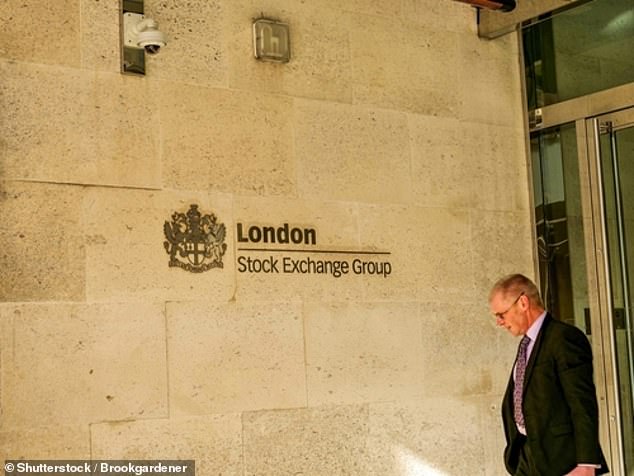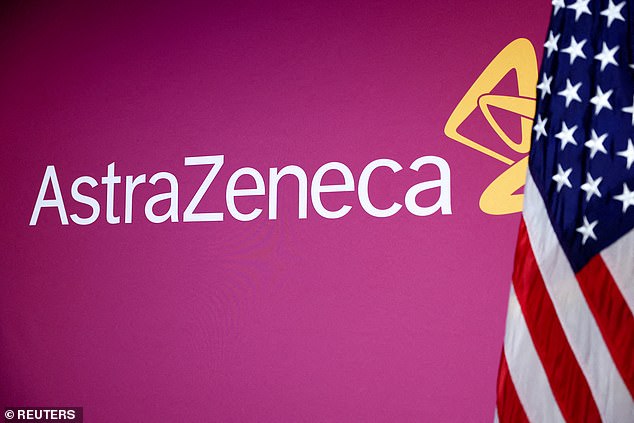- Peel Hunt says stamp duty on shares could see firms disappear
- Warning it is ‘highly likely’ AstraZeneca will exit and others will follow
Rachel Reeves must scrap stamp duty charged on shares or risk a looming exodus of major companies from the London Stock Exchange, a City broker has warned.
It follows fears pharmaceutical giant AstraZeneca will abandon London and the FTSE 100 entirely after it announced plans for a direct New York listing at the end of September.
The £170billion Anglo-Swedish giant is boosting its presence in the US to reach a broader mix of investors and put itself in a better position to cope with trade tariffs.
But the move will also save AstraZeneca investors around £200million each year in stamp duty costs, according to head of research at Peel Hunt Charles Hall.
‘Other UK companies are likely watching [AstraZeneca] with interest, which could put a big hole in a tax that generates £4.5billion,’ Hall wrote in a research note published on Friday.

First one out the door? Peel Hunt warns AstraZeneca could spark wave of defections to the US
He warned Britain ‘losing [its] companies to the US due to stamp duty would be a massive own goal’ and urged the Government to respond urgently by scrapping stamp duty.
And the move would not only keep companies in Britain, according to Hall, but ‘trigger a material improvement in UK equity valuations, drive higher Capital Gains Tax (CGT) receipts, enhance activity in UK capital markets, and increase spending power’.
‘Highly likely’ AstraZenca exits London
AstraZeneca shares are currently quoted in the US as an American Depositary Receipt, which represents shares in foreign companies.
Shifting to a direct listing will mean New York shares are transferred into the US clearance system, and London shares will be held through a ‘depository interest’ – a UK-registered security that allows investors to trade and settle non-UK company shares domestically.
Neither will be subject to stamp duty, according to AstraZeneca, whose shareholders will vote on the share structure harmonisation proposals on 3 November.
Purchases of London-listed shares are generally subject to a Stamp Duty Reserve Tax rate of 0.5 per cent.
While the duty is paid by the purchaser of shares and not the company, critics argue the tax still has an impact on the liquidity and value of London-listed firms.
Hall said: ‘We note that Indivior used the same structure [as proposed by AstraZeneca], with its shares held in DTC and DIs traded in Crest, and as a result the shares were no longer subject to [Stamp Duty Reserve Tax], even while it had its primary listing in the UK.
‘The company subsequently moved its primary listing to the US and cancelled its secondary listing in the UK.’
Hall said liquidity in AstraZeneca’s shares is likely to shift to the US once the direct listing is enacted, warning ‘it is highly likely that in time the company may consider moving its primary listing from London to the US’.

Charles Hall said other major companies will be watching AstraZeneca’s next steps with interest
Urgent action required
Its departure would result in a move to a secondary listing in the UK and the loss of the largest constituent of the FTSE 100, as well as around 5 per cent of the £4.5billion the Treasury collects though stamp duty on shares, according to Hall.
He added: ‘Assuming AstraZeneca has a positive experience, we believe it likely that other companies will follow. In fact, boards would be negligent if they did not consider this.
‘Companies that shift listings to the US are likely to shift talent and tax revenues as well. It would be incredibly complacent for policy makers to take our largest companies for granted.
‘The proposed changes from AstraZeneca mean that this shifts from being a niche topic to an essential item for the government to address.
‘The challenge is clear – do we want to have one of the leading equity markets in the world, and retain our largest companies, or are we prepared to let the revenues leave, lose our key companies, and all the considerable value that they provide to the UK?’
DIY INVESTING PLATFORMS

AJ Bell

AJ Bell
Easy investing and ready-made portfolios

Hargreaves Lansdown

Hargreaves Lansdown
Free fund dealing and investment ideas

interactive investor

interactive investor
Flat-fee investing from £4.99 per month

InvestEngine

InvestEngine
Account and trading fee-free ETF investing

Trading 212

Trading 212
Free share dealing and no account fee
Affiliate links: If you take out a product This is Money may earn a commission. These deals are chosen by our editorial team, as we think they are worth highlighting. This does not affect our editorial independence.
